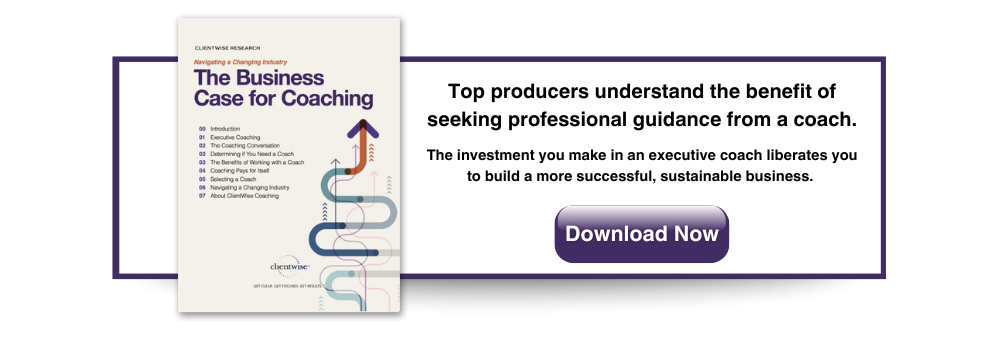Client Engagement: Your New Growth Strategy
Let's clarify a common advisor misconception: client engagement is NOT the same as simply staying in touch. Sending out birthday cards, delivering quarterly market commentary emails or videos, and hosting annual client reviews isn't engagement – it's maintenance. Necessary? Absolutely. Differentiating? Not even close.
Real client engagement is emotional. It's intentional. It's rooted in perceived relationship value and trust. And when it's done well, it becomes a core strategy that fuels greater client loyalty, deepens relationships, and spans generations – a differentiator no competitor can copy.
During coaching conversations, I typically ask advisors how they engage with their clients. Over and over, I'm told that they have great engagement…their client retention rate is over 97%, and they constantly stay in touch. When I dig a little deeper and ask for examples, however, more often than not, the answer sounds like a routine checklist: "We send them performance reports each quarter, periodic updates during tax season, and then birthday and holiday cards." That's the kind of engagement one might expect from a car dealership rather than a financial advisor!
Keep in mind that we're living in an era of hyper-personalization. Your clients are comparing the quality of your responsiveness, attentiveness, and relevant importance not to other advisors, but to Amazon, Apple, and Netflix. And if your firm isn't keeping pace, those clients are at risk of drifting away.
What Real Engagement Looks Like
Authentic engagement is not about the frequency of your touches. It's about the depth of the connection. It's about whether the client feels seen, heard, and understood. And that feeling doesn't come from automation. It comes from intentionality. Building this type of connection can't be outsourced to software, and it can't be sustained from individual charisma alone. It has to be woven into the culture of your firm. Essentially, this kind of effective engagement shows up in three fundamental ways:
- Proactive conversations: Demonstrate you both understand and care about the client by anticipating important transitions, potential tax events, or planning needs and initiating conversations about those topics before the client needs to raise them. For instance, hearing that a wealthy couple's adult child is getting married and reaching out to suggest a meeting to discuss how to modify their wealth transfer and asset protection plans.
- Customized communication: Adapt how you share information based on how each client most effectively processes it. Some clients may prefer charts and visuals, while others want more context and detail. Some will appreciate frequent, brief touchpoints while others value face-to-face, in-depth conversations. Understand and identify which approach works best for each client.
- Recognition of life milestones: Be a more attentive, active listener in client conversations and capture that information in your firm's CRM. Commit to going beyond the expected birthday card and note to show deeper engagement and interest, acknowledging major events (e.g., their kid's graduations, the birth of a grandchild, the sale of a business, a significant promotion, etc.) in the same way a friend rather than a vendor would.
When you get these right, you stop being replaceable and become unforgettable. Done well, engagement becomes 'advisory equity' – building a reservoir of client trust that pays off in retention, referrals, and cross-generational continuity. Given the current environment of increased commoditization, robo advisors, AI-generated planning tools, and off-the-shelf portfolios (with every other firm touting tax alpha and holistic planning), this is one way to differentiate and stand out.
Beyond the Numbers: A Story of Trust in Action
Consider this real-life example from a few years ago. It’s an example that always comes to mind when I think about advisors going above and beyond in their client engagement efforts.
It was the middle of the COVID-19 pandemic when the call came in—unplanned, unexpected, and unforgettable.
The client, a recently widowed man in his seventies, was alone in a hospital in Florence, Italy. He had traveled abroad for the first time since losing his wife, a quiet attempt to reclaim something of himself after grief had hollowed out his world. But with a pre-existing medical condition and no family able to travel, the situation turned quickly. He didn’t know who else to call—so he called his advisory team.
Not a travel agent. Not a concierge service. His financial advisory team.
Because over the years, they had become more than that. They were his steady hands. His sounding board. His inner circle.
The team could have offered condolences and promised to stay in touch. Instead, they asked a different question: Who on our team is available to get on a plane? In the middle of Covid-19. To Italy, which had “locked-down” in a severe way.
Within hours, flights were researched. Passports checked. Logistics set in motion. One team member volunteered to go—no hesitation. They arranged for translators, medical advocates, discharge approvals, and coordinated to get him safely back to the U.S. Every detail was handled—not because it was in a service agreement, but because it was the right thing to do.
This wasn’t portfolio modeling. This wasn’t cash flow analysis. This was humanity. And it was built on a foundation of trust so deep that, in a moment of vulnerability, the first call he made was to his advisor.
No AI will ever make that trip. No algorithm will sit by that hospital bed. And no digital solution will ever replace the relationship capital that teams like this build over time—by showing up, by listening, and by doing what matters most when it matters most.
Is this an extreme example? Yes. But it’s not fiction. It’s a vivid reminder of what it really means to be in this profession. This is what it looks like to be in the business of transformational trust, not just transactional advice.
So the next time someone asks what differentiates your team, tell them this story—or better yet, build the kind of relationship that writes one of its own.
You Can't Scale Engagement (or Charisma)
If your engagement strategy depends on a single team member's memory, energy, or personality – then you have an impassable ceiling. And more importantly, you're carrying a tremendous risk. This is where infrastructure matters.
- Map out your client journey (from onboarding through every meaningful milestone) and identify those key 'surprise and delight' moments that require proactive communication
- Incorporate those milestones into your CRM and assign shared ownership of the relationship beyond the lead advisor
- Shift your annual review focus from "here's how your portfolio performed" to "here are the key things we've achieved together this year." Focus on achievement reviews rather than just performance reviews
- And celebrate those wins – financial, personal, and relational. Be prepared to jog the client's memory with all that you've been working on and a checklist of the things your team has delivered/accomplished during that time period
Never fall into the common trap of guessing or assuming how a client feels. Ask them. Use surveys, interviews, or third-party feedback tools. Because what gets measured, gets managed – and improved.
Unfortunately, too many firms treat white glove engagement as a luxury. Elite firms, on the other hand, treat it as a necessity. When done with intention, engagement becomes akin to a competitive moat. It's the thing that helps keep your clients loyal, referable, and eager to introduce the next generation.
So, stop asking, Are we staying in touch? Start asking, Are we staying relevant? Are we deepening connections? Are we creating moments that matter? If you want to build a billion-dollar business, you need to engage like one. In an AI-driven world, human relevance is your edge—and it's non-negotiable.
Coaching Questions From This Article
- What moments in your client experience could become more intentional, personalized, and meaningful?
- Where are you relying on routine communication instead of true engagement? And what's one shift you could make?
- Who, beyond the advisor, owns the client relationship, and how are you reinforcing that connection?
- If your top clients were asked how your firm makes them feel, what do you hope they'd say, and what needs to change to make that true?
About ClientWise LLC
ClientWise is the premier business and executive coaching firm working exclusively with financial professionals. We specialize in helping clients optimize growth and maximize revenue by engaging as a knowledgeable partner in accomplishing specific and significant business results. Our full-service coaching program empowers financial advisors, wholesalers, managers and executives to enhance performance through customized, action-oriented solutions based on each client’s specific vision and situation.
Our certified coaches are members of the International Coach Federation (ICF). They adhere to ICF’s strict code of ethics and have the experience and insight to work with you on the unique challenges and opportunities you face each day.
Drawing from an in-depth knowledge of the financial industry, ClientWise’s mission is to professionally develop industry leaders and consistently raise the bar for industry service, commitment and integrity. Simply put, our singular focus is to help you get clear, get focused, and get results.
Topics: Client Engagement Most Recent



